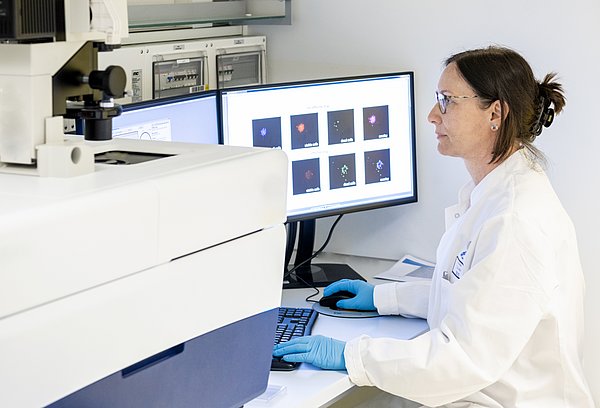The Hopp Children’s Cancer Center Heidelberg (KiTZ) is a joint institution of the German Cancer Research Center (DKFZ), Heidelberg University Hospital (UKHD) and the University of Heidelberg (Uni HD).
Cancer remains the leading cause of disease-related death in children and adolescents: Every year, about 9,000 children and adolescents in Europe are diagnosed with cancer. Approximately one in four of these young patients cannot be cured with current standard therapies and do not survive the disease. According to experts, pediatric oncology lacks modern, established treatments that are already being developed in adult oncology.
In 2017, the European Union's Innovative Medicines Initiative 2 (IMI2) ITCC-P4 project was launched to developpreclinical laboratory models for the most common high-risk childhood cancers and also relapses that are currently under-treated. These tumor models provide more meaningful results for the preparation of clinical trials than is currently possible with the usual tests on cancer cells in culture dishes or on genetically uniform mouse strains. To develop such tumor models, for example, cancer cells from individual young patients are transferred to mice. These cancer cells can then be extensively studied in their biology and used to systematically test and prioritize new therapeutic approaches at preclinical compared to the currently used standard therapies.
Preclinical laboratory models specific for childhood cancers, could play an important role in the approval of all cancer drugs in the future. Currently, the EU regulation of the European Medicines Agency (EMA) is being adapted to the recently adopted new regulations in the USA. According to this, all cancer drugs that receive approval must also be tested for the treatment of childhood cancer if the mechanism of action is relevant to childhood tumors. "It is therefore becoming apparent that preclinical testing in pediatric tumor models will become a prerequisite for the approval of all new cancer drugs in the EU, as it is already in the US, even for drugs that are primarily developed for adults," says Stefan Pfister, director of the KiTZ, department head at the DKFZ and pediatric oncologist at the University Hospital of Heidelberg (UKHD). Together with Gilles Vassal, from the French Gustave Roussy Comprehensive Cancer Center and the current president of ITCC, he forms the interim management of ITCC-P4 gGmbH. "Until now, neither the pharmaceutical companies nor the pediatric oncology research community have been sufficiently prepared because, especially for high-risk tumors, there were very few and poorly characterized and standardized preclinical laboratory models to conduct systematic drug trials," adds Gilles Vassal.
The project has developed more than 400 tumor models, including those for rare childhood cancers, and characterized in detail their molecular and pharmacological properties when treated with radiotherapy, chemotherapy and various anti-cancer drugs. With ITCC-P4 gGmbH as the licensor, these preclinical models are now available to pharmaceutical companies and academic institutions for drug testing. Preclinical testing with the newly developed tumor models is offered by the biotech companies Charles River Laboratories, Experimental Pharmacology & Oncology -Berlin-Buch GmbH and Xentech. Proceeds will be ploughed back into the shareholders' research to further develop drug tests with new preclinical models. For instance, cancer cells from tissue samples, which grow into three-dimensional mini-tumors in the laboratory, can also be used as a test model in order to carry out high-throughput drug tests with numerous drugs simultaneously.
Shareholders in this collaboration between private companies and academic centers include 11 research institutions and three biotech companies. ITCC-P4 gGmbH is the first and only non-profit company in the world to offer access to laboratory models for systematic efficacy testing on fully characterized pediatric tumor models. This will facilitate prioritization of anticancer compounds to be developed in children and adolescents and contribute to accelerate therapeutic innovation for patients still dying of pediatric cancer. This project has received funding from the Innovative Medicines Initiative 2 Joint Undertaking under grant agreement No 116064. This joint undertaking receives support from the European Union’s Horizon 2020 research and innovation programme and EFPIA.
More information on the EU project, started in 2017:
- https://www.imi.europa.eu/projects-results/project-factsheets/itcc-p4
- https://www.ihi.europa.eu/projects-results/project-factsheets/itcc-p4
- https://www.itccp4.eu/
- https://www.dkfz.de/en/presse/pressemitteilungen/2017/dkfz-pm-17-56-Accelerating-drug-development-for-children-with-cancer.php
List of ITCC-P4 gGmbH shareholders:
- Alleanza Contro il Cancro, Rome
- Charité – Universitätsmedizin Berlin, Berlin
- Charles River Discovery Research Services Germany GmbH (CRL), Freiburg
- Experimental Pharmacology & Oncology -Berlin-Buch GmbH (EPO), Berlin-Buch
- Deutsches Krebsforschungszentrum (DKFZ), Heidelberg
- Impulsa Iniciatives en Salut, S.L, Esplugues de Llobregat
- Institut Curie (IC), Paris
- Gustave Roussy Comprehensive Cancer Center, Villejuif
- Medizinische Universität Wien (MUW), Vienna
- Prinses Máxima Centrum voor Kinderoncologie B.V. (PMC), Utrecht
- The Institute of Cancer Research: Royal Cancer Hospital (ICR), London
- University of Newcastle upon Tyne (UNEW), Newcastle
- XenTech SAS (XenTech), Evry-Courcouronnes
- Universität Zürich (UZH), Zurich




